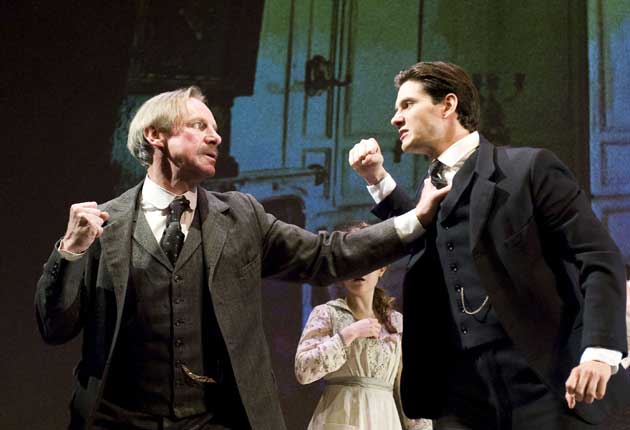First Night: Birdsong, Comedy Theatre, London
Ghosts from the past brought to life in poignant tale of love and war

You can see why Sebastian Faulks's great 600-page First World War novel Birdsong would make a good film: horrendous scenes of trench warfare, literally book-ended by a lost, idyllic world of rivers and fields and a new dawn rooted in the modern day honour paid by the hero's investigative grand-daughter.
And that film has nearly been made five times, apparently, since the novel was published in 1993. Instead, we now have a brilliant theatrical filleting by the young playwright Rachel Wagstaff, ingeniously realised by director Trevor Nunn and his greatest design associate, John Napier.
That pairing, which brought us Cats, Starlight Express and Les Miserables, presents something both stark and beautiful, something of a surprise, perhaps, in which Ben Barnes as Lieutenant Stephen Wraysford – tall, dark, troubled and jumpy, a perfect fit for the role – revisits his own story like a narrating ghost.
Stephen has arrived in Amiens in 1910 as an outrider for his home textile firm, and falls in love with Isabelle Azaire (Genevieve O'Reilly), the wife of his factory-owning host, who is beaten every night, bullied and bruised into meekness. The couple elope, with the curse of the husband predicting they will go to hell. The stage folds forward and the nightmare looms.
That first act is summoned with evocative projections of the landscape around the river Ancre and the Somme that will soon be defiled. The staging can embrace a sunny day's punting down the river and a claustrophobic warren of tunnels where the British "sewer rats" support the advance with tactical minefields and human sacrifice.
Sometimes resembling a cross between Journey's End and Oh! What a Lovely War, the squaddies are kept amused by Jack Firebrace's music hall turn (Lee Ross is outstanding) while Stephen is kept to his task by the Scottish general (Nicholas Farrell) and the growing encouragement of Isabelle's sister, Jeanne (Zoe Waites).
Perhaps the reunion of Stephen and Isabelle is not as heart-stopping as it is in the novel, but the great stretch of time is necessarily condensed to bare bones. The modern chapters are ditched, but the long, hard crawl to the end of the war underground is beautifully played by Barnes and Ross as they cement an unlikely friendship.
Some of the projections are drawings, some photographic, all scenically complimentary to the suffocating locations and the amazing sound (by Fergus O'Hare) of rumbling warfare, explosions and sniper fire. There's a great moment when the soldiers climb ladders for the start of the Battle of the Somme, stuck to the mud and grime like limpets in helmets, ready for destruction.
It's the sheer grinding horror of the physical conditions that make Stephen, a fluky survivor, hardened towards any memory of normal life. He has even forgotten why he is fighting at all. The play never gets bogged down in repetitive manoeuvres, bringing Jeanne into the story earlier but preserving the heart-rending conclusion as Stephen is told about the end of the war by an enemy.
There is no weak link in Nunn's cast of 15, with Iain Mitchell playing the boorish neighbour in Amiens and a blimpish colonel at the front, and Paul Hawkyard and Owain Arthur notable in the ranks. The three-hour play poignantly intermingles ghosts of past and present, and fully expresses the black poetry of this carnage as a defacement of humanity, and the landscape it inhabits.
Join our commenting forum
Join thought-provoking conversations, follow other Independent readers and see their replies
Comments
Bookmark popover
Removed from bookmarks